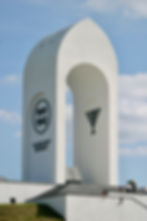Never Forget, Never Again: Why We Return to Traumatic Places©
- Rabbi David Baum
- Jun 6, 2025
- 5 min read
Yizkor Sermon - Shavuot 2025/5785
I was asked a very important question by a rabbinical student when I led the Flesh Family Sinai Temple Israel Center Rabbinical School Fellowship trip to Israel.
We were in Southern Israel, the air was dry, and the heat was bearing on us. First, we went to the site of the Nova festival; we saw the ongoing creation of a holy site of martyrdom, where hundreds of young Israelis were massacred.
Then we went to Kibbutz Nir Oz, where one out of every four residents was either murdered or taken hostage to Gaza, where close to 20 still remain alive, waiting to be rescued.
After hearing the story of one family’s survival, one of the students had to step away; it was too painful to handle.
The student asked me: why are we here? Is this trauma tourism?
I have stood at the sites of the Jewish people’s most traumatic experiences. At 16, I said a prayer in Auschwitz for my family who were murdered.

When I was 26, I led a prayer at Babi Yar for college students, the site of the massacre of 250,000 innocent Jews during the Holocaust in Ukraine, and led a prayer. Once again, I stood at a place soaked in Jewish blood and led the same prayer I had led in each place: the El Maleh Rachamim.
When people asked me, why do we go back to these sites, the answer used to be, Never Again. We must return to ensure that never again will our people be massacred. But October 7th changed that.
Never Again is still our mantra, but we also must say, that Never Forget is just as sacred.
On the Shabbat before Shavuot, we began the book of Numbers, BaMidbar. It begins with a census, counting men aged 20 years and up. Most of the commentators see the writing on the wall – the census was for one purpose: war. They did not count the Levites, the women, the children, and the elderly because they would not fight. There is a general unease when it comes to counting Jews - there is a danger that is inherently present - counting could lead to us becoming desensitized to the loss of said people. It could also lead us to come to different conclusions.
Dr. Jacob Milgrom writes in the JPS commentary to Numbers: "The basis for the taboo against a census is not known, although one plausible suggestion has been offered: As the shepherd counts his sheep, so the counter of persons must be their owner, a title belonging solely to God and not to man."
But there is something necessary about counting, and taking note of those numbers. A famous commentator, Rashi, gives us his view of the counting in this parashah:
Because of God's love for them, God is continually counting them. He counted them at the time of the Exodus; again after so many died at the time of the Golden Calf incident. He counted them to find out how many were left; and now when He was going to rest His Shechinah (divine presence) upon them he counted them again.
At this point, when God was about to rest over them as they get ready to journey from Sinai, a high point, a point of renewed connection and relationship, he counts them again. I believe that his commentary attempts to make the counting that will dominate the next couple of parshiot more meaningful.
As we read on in the chapter, we read a series of names and numbers of the heads of the tribes and their fighting numbers. The names that are relevant to us are the ones we know like Jacob's sons, or names like Nachshon ben Aminadav. Perhaps these names matter because we have seen their good times and their bad times. When we read about Reuven, we remember that he was the one who tried to save his brother Joseph in the pit, but we also remember Jacob's rebuke of him on his deathbed as the son who mounted his father's bed and brought him disgrace. We remember Judah and his relationship with Tamar, not one of his finer moments; but we also remember his courage in confronting Joseph to save Benjamin while in Egypt. Of course, we remember the Nachshon Ben Aminadav because in the midrash he took the first steps into Red Sea as a test of faith and only then did the sea split. It is because we know these names, not only the good times, but the difficult times, that they matter to us. This is what it means to be counted.
God counts them, because he loves them. After every incident when they lose people, at pivotal moments of their lives, God counts them. He has to count them in order to bring them under the wings of the Divine presence.

At the Nova festival, there is a field of sticks with pictures of each victim. QR codes on each mounted picture bring you to their Instagram stories, a digital timeline of their lives, a generation that grew up with social media.
Ben Fishman, his smiling face looking at me in his IDF uniform;
Liron Barda, her smiling face taken from a picture while she was enjoying a vacation;
Eden Ben-Rubi, with her dreadlocks and piercing blue eyes.
I could only visit some of these faces; the field was too vast. But, as I stared at each one, and saw their social media accounts, I thought about stars.

Jews have always been associated with stars. When God made His covenant with Avraham he told him to look at the stars, to try and count them, that his descendants would be as numerous as the stars. In this way, God told Avraham to look to the future – that is what the stars were, a hope for future offspring.
The stars are not just the future, but also the past.
In the book of Daniel, the prophet tells about a future time when the dead will be resurrected. He said, “At that time, your people will be rescued. Many of those that sleep in the dust of the earth will awake, some to eternal life, other to reproaches. And the knowledgeable will be radiant like the bright expanse of sky and those who lead the many to righteousness will be like the stars forever and ever.”
The middle line, yizharu kezohar harakia, shine like the radiance of the sky probably sounds familiar. The rabbis liked that image so much that they used it in the El Malei Rachamim memorial prayer, Bema’a lot Kedoshim Utehorim, Kezohar Harakia Mazhirim, amongst the holy and pure, who shine like the radiance of the sky, which we will recite in a few minutes.
Psalm 147, which we read during Psukei D'Zimrah everyday has a powerful line:
הָרֹפֵא לִשְׁבוּרֵי לֵב וּמְחַבֵּשׁ לְעַצְּבוֹתָם
(God) heals the broken-hearted, binds up their wounds
מוֹנֶה מִסְפָּר לַכּוֹכָבִים לְכֻלָּם שֵׁמוֹת יִקְרָא
He counts the number of stars, to each one of them he assigns a name.
Moneh Mispar LaCochavim – It's a message to all us – If God heals broken hearts, so can we. If God could count all the stars, and not only count them, but give them names, so should we.
We must count the stars—not simply as numbers, but as sacred souls, each with a story, a purpose, a name. Our responsibility is to hold their memories close, ensuring their light never fades.
We revisit these sites, not as tourists of trauma, but as bearers of memory. Each name, each story, each face on those sticks, demands to be remembered, to be counted, to be loved. Just as God counts because of deep love, we too count, honoring each precious life as infinitely valuable.
During the Yizkor service, a service of remembrance, let us pledge that their stories become woven into our own, their memories guiding us toward lives of greater compassion, resilience, and hope. May we shine their lights forward, transforming grief into meaning, memory into mission, and their radiant legacy into stars illuminating the paths of future generations.






